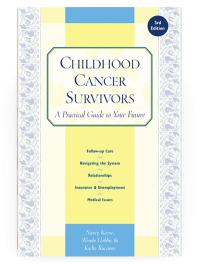Childhood Cancer Survivors
Heart valves
The valves that control the flow of blood in the heart can become stiff or leaky after high-dose radiation to the chest (e.g., mantle radiation to treat Hodgkin lymphoma).
Signs and symptoms
Valvular disease may be asymptomatic or it may cause symptoms such as the following:
-
Shortness of breath
-
Fatigue
-
Palpitations
-
Rapid heartbeat
-
Swelling of ankles
-
Prominence of veins in the neck
-
Cough
-
Difficulty with exertion
Screening and detection
Regular and lifelong screening using an echocardiogram is done to check for possible valve problems caused by radiation to the heart. See Table 1 at the end of this chapter for recommended screening schedules.
I was treated for 10 years for leukemia and I had three relapses. In my 20s, I started having severe chest pains so I went to a cardiologist. He did a brief exam and said I had mitral valve prolapse and there was nothing that needed to be done. He gave me a pamphlet on my way out, and the pamphlet said mitral valve prolapse could only be confirmed with an echocardiogram, which I never had. So I asked my oncologist to recommend a cardiologist and I got another opinion. He ran a battery of tests and said my heart was fine. He thought it could be stress or esophageal reflux.
Medical management
Medical management should involve frequent surveillance for symptoms in at-risk survivors. A variety of medications and lifestyle modifications may be used to treat heart valve damage. Severe damage to valves in the heart may require surgery to replace the valves. This care should be directed by a cardiologist.
I had 18 treatments of mantle radiation when I was 15 years old in 1971. I don’t know how many rads. Heck, back then they didn’t even tell you that it was cancer. I had a slight heart murmur for years that went from a whisper to a waterfall after a fever. When I lie on my side I can hear it: boom, squish, boom, squish. I had a transesophageal echocardiogram and it showed stenosis of the mitral and aortic valves. I take medicine to slow my heart rate, and the valve problem has not worsened. Eventually I’m going to need the valves replaced. Right now I can walk on flat surfaces for an hour, but I have a really hard time on inclines. I can’t do heavy work like shoveling snow or raking leaves.
If you have valve damage or have had a valve replaced, you should take an antibiotic before dental work or any other invasive procedure (such as a colonoscopy). The antibiotic can help prevent endocarditis, a serious heart infection caused by bacteria entering the bloodstream during the procedure. The healthcare provider who will do the procedure (dentist or doctor) should write the prescription for you.
Table of Contents
All Guides- 1. Survivorship
- 2. Emotions
- 3. Relationships
- 4. Navigating the System
- 5. Staying Healthy
- 6. Diseases
- 7. Fatigue
- 8. Brain and Nerves
- 9. Hormone-Producing Glands
- 10. Eyes and Ears
- 11. Head and Neck
- 12. Heart and Blood Vessels
- 13. Lungs
- 14. Kidneys, Bladder, and Genitals
- 15. Liver, Stomach, and Intestines
- 16. Immune System
- 17. Muscles and Bones
- 18. Skin, Breasts, and Hair
- 19. Second Cancers
- 20. Homage
- Appendix A. Survivor Sketches
- Appendix B. Resources
- Appendix C. References
- Appendix D. About the Authors
- Appendix E. Childhood Cancer Guides (TM)

